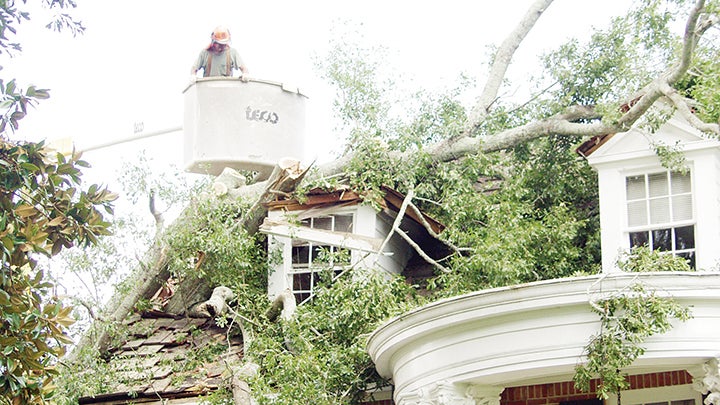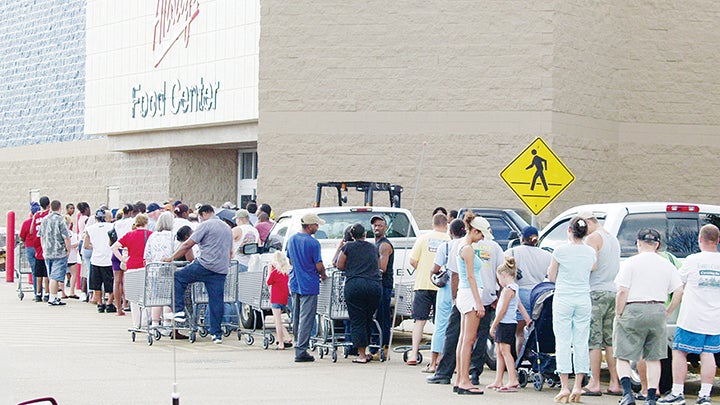Dorian stirs memories of Katrina
Published 9:40 pm Wednesday, August 28, 2019
The 14th anniversary of Hurricane Katrina comes as Hurricane Dorian threatens Florida’s east coast and could potentially head to Mississippi, its effects possibly reaching Lincoln County.
Katrina devastated the Mississippi Coast, claiming 238 lives and destroying thousands of structures after it made landfall at 2 a.m. on Aug. 29, 2005.
“We had to cut our way through trees, mostly in rural areas, to get water to people,” said Chief Deputy Johnny Hall Jr. with the Lincoln County Sheriff’s Office, who worked 12 to 13 hours a day for 30 consecutive days with others to meet the needs of residents.
Katrina first made landfall in Louisiana, then hit Mississippi, causing a 28-foot storm surge that pushed 6 to 12 feet inland. Katrina barreled north, reaching Meridian about 7 p.m., and blew into Tennessee as a tropical storm. It lasted over 17 hours and spawned 11 hurricanes in Mississippi and more than 50 total.
In Mississippi, Katrina left 238 people dead and destroyed billions of dollars of property — homes, roads, boats, bridges, businesses, cars.
In Lincoln County, power outages and a lack of clean water, food and gasoline slowed recovery efforts. As many as 10,000 of Entergy’s 12,000 area customers were without power on Aug. 31, 2005. Entergy had 250 crew members on the ground in Lincoln County working to restore electricity.
Roads were blocked by trees and other debris. Some homes were damaged as well.
On South Jackson Street, in what appeared to be one of the hardest-hit areas of Brookhaven, Johnny Perkins and family members watched as a crew worked to remove a large oak tree from the home’s roof. A block over on South Church Street, Asem Zeini surveyed damage after a large oak tree fell on his home. He said the tree was one of the first to fall when the hurricane winds passed through the city.
“It sounded like somebody dropped a bomb on the house,” Zeini said.
Shelters were opened in the area — both for locals and evacuees from the Coast.
It was a trying time for the entire state, but like Mississippi always does, it bounced back. The warmth and generosity of the state’s people were on display as neighbors helped neighbors rebuild.
With Dorian a potential threat, it brings back memories of Katrina’s wrath in Lincoln County, and reasons to prepare for a hurricane in advance.
After Katrina, first responders dealt with flooding, a gas shortage and getting water to people trapped by trees and debris. Meanwhile, residents reeled from the experience of high winds, torrential rain, property damages and blocked roads.
“We found people without electricity, no ice, no water,” said Hall, who slept in the back of his truck a while. The soaring heat made the truck bed cooler than the inside of his house.
“We had to take control of one of two gas stations on 84 to have fuel for police cars and ambulances, and we provided fuel for hospitals’ generators and for the jail,” Hall said.
One of the hardest things, he said, was unloading trucks of ice, water and food.
“Imagine the chaos of giving a gallon of water to people after a hurricane,” Hall said. “Some people wanted to fight.”
And then came MREs (meals ready to eat), which the Army veteran had eaten for several years. He knew people running out of food would clamor for them.
I-55, with only northbound traffic, had overflowed north of Bogue Chitto and refugees had booked all the area’s hotel rooms, Hall said. The area’s shelters filled up, and refugees were sent north, east or west, he said.
It took a couple of months to clear fallen trees and debris, Hall said.
“It was a trying time, but we got through it,” he said. “It was rough, but there’s one thing I can say for Lincoln County. Everybody pulled together. When times are bad, we try to come together and make it right.”
Hall said everyone should begin to prepare for a hurricane when they hear one could head this way. The possible approach of Dorian means to start preparing now, he said.
What you need to prepare
• Gas up your vehicles and get medicine, cash, non-perishable foods, a manual can opener, important documents and an emergency kit if you don’t have one.
• Flashlights or candles, batteries and a radio.
• Three gallons of water per person for at least three days.
• Check your supplies of toilet paper, paper plates, plastic utensils, trash bags, toothpaste and tooth brushes, and for the needs of your pets and farm animals.
• If you have a generator or a grill, check your propane or charcoal supply.
• Remove stationary objects from your yard.
• Gather board games, a deck of cards, books, crossword puzzles and small toys for children in case you lose electricity.
• Take pictures of the inside and outside of your home, and of valuables and your vehicles, for insurance purposes.
If you plan to evacuate
• Plan your route in advance and let relatives know where you plan to go.
• Gather your emergency supplies and pack pillows and blankets in your car.
• If you have pets, check in advance if your pets will be accepted. Or ask your veterinarian about boarding resources.
• MDOT’s primary evacuation route for the Lincoln and Lawrence county areas is taking I-55 to I-20, and going east to Meridian or west to Vicksburg, according to the Mississippi Department of Transportation. An alternate route from I-55 is taking Mississippi 27 west to Vicksburg, or Hwy. 84 west to Natchez or east to Laurel. Also, there’s northbound highways off Hwy. 84 that lead to I-49 and I-20.
MDOT stands ready to clear state highways quickly after any tropical system, MDOT Southern District Commissioner Tom King said in a news release.
King said that within six hours of Katrina’s landfall, MDOT “opened all structurally safe roadways to emergency response teams. Within 16 hours, all state-maintained highway lanes had been cleared and opened for the public to access. However, major reconstruction was necessary, including two bridges on the beachfront U.S. Hwy. 90.”
“Our first responders are always on standby for any emergency. We are stationed and prepared to immediately inspect roads and bridges and ready to clear debris to get highways open for other emergency responders.”
Story by Robin Eyman







